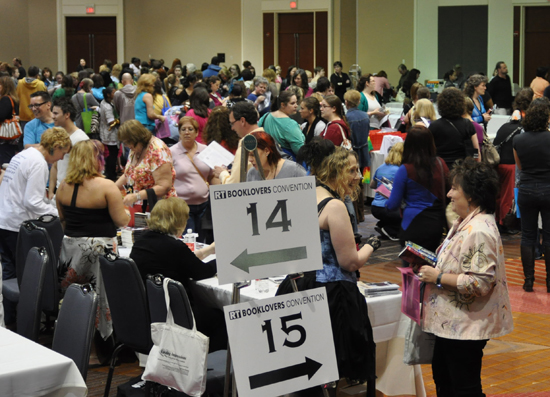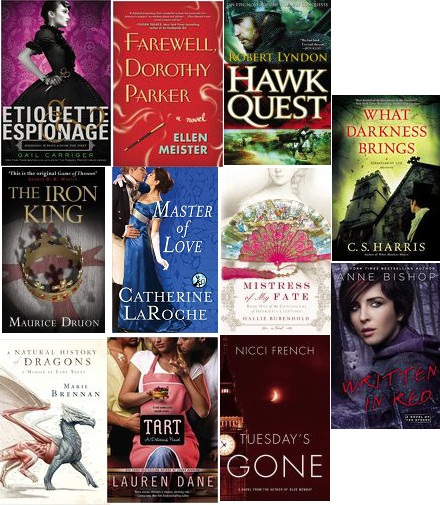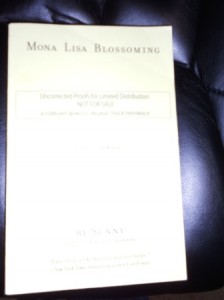 Last week, and it is difficult to believe it was already more than a week ago, the American Library Association held its Annual Conference in the land of Mickey Mouse, Anaheim, California.
Last week, and it is difficult to believe it was already more than a week ago, the American Library Association held its Annual Conference in the land of Mickey Mouse, Anaheim, California.
And there was a kerfuffle on YouTube about ARCs and who should be able to pick up how many on the exhibit hall floor.
Two bloggers at The Lost Lola posted a 22-minute video, since retracted, detailing their incredibly awesome book haul at ALA. They scored, and I think scored is a fair assessment, two copies of everything possible, including a lot of books they had no personal interest in.
A librarian who blogs at Stackedbooks questioned on Twitter how authors would feel “knowing a librarian couldn’t get an arc of their book at ALA, but a blogger picked up multiple copies.”
The Lost Lolas have printed an impressive and well-thought out response and clarification, but lots of questions still stand.
 Let’s start at the beginning. I have described ALA as BEA for librarians, and I think it’s a fair description. ALA is a business conference for libraries, just as BEA is a business conference for the book industry. And just like the book industry, a good bit of the business of libraries happens to be books.
Let’s start at the beginning. I have described ALA as BEA for librarians, and I think it’s a fair description. ALA is a business conference for libraries, just as BEA is a business conference for the book industry. And just like the book industry, a good bit of the business of libraries happens to be books.
Not all of it, but a lot of it. That doesn’t make ALA a book convention. There was another half of the exhibits that was all about automated systems, materials-handling units, furniture, and supplies. This stuff isn’t sexy, but it was all on that floor. And those things are a significant part of the business of libraries.
Libraries do promote reading. And one of the ways we promote reading is through books. (I can hear you saying “well, duh” from here). Libraries are also part of the publishers’ ecosystem to promote books and authors. Libraries constitute about 10% of book sales in the U.S overall. For some genres and markets, like children’s books and audiobooks, we’re a lot more.
For midlist authors, libraries are a critical lifeline. Libraries provide the author, not just sales, but also word-of-mouth “advertising”. If the librarian likes the book, it gets “sold” across the desk. One enthusiastic reader puts the book directly into the hands of another. It’s a trust relationship.
We bloggers are trying to get into that “space” but we’re not there yet.
For anyone who has noticed that I’ve said we on both sides of this issue, I have. I am a librarian. I attend ALA because I am a member of the Association, and because I serve on a committee. I’m part of the business of the Association that gets done at the Conference.
And right now, most of my day-to-day work is as a book blogger.
But ALA is a business convention. It’s one of the largest conventions in the U.S. Not just for the number of people who attend (20,000!), but also for the number of simultaneous meeting rooms. On Saturday and Sunday, there are more than 100 meetings every hour.
And because it’s a business convention, if you’re there to be at a meeting, or three, or five, you can’t drop everything to stalk the exhibit halls for the author signings. People notice when you don’t show up at committee meetings, especially if you’re the chair of the committee. Or when you don’t make the presentation when you are one of the speakers.
ALA is a volunteer-run organization for the most part. The members do most of the work.
So when a librarian can’t be in the exhibit hall at a particular time for a particular signing, it’s because she or he has a commitment to keep. It’s a working conference.
 But what ALA isn’t, is a book convention. It’s not RomCon or the RT Booklovers Convention or even WorldCon. There’s a picture (at right) from the RT Booklovers Book Fair, where the description touts the 100’s of authors who are there just to sign books. That’s not what ALA is.
But what ALA isn’t, is a book convention. It’s not RomCon or the RT Booklovers Convention or even WorldCon. There’s a picture (at right) from the RT Booklovers Book Fair, where the description touts the 100’s of authors who are there just to sign books. That’s not what ALA is.
The thing about this whole mess is that all the parties involved went in with different expectations. The bloggers saw it as a book conventions, with that set of expectations. They had a plan of attack to maximize their resources to get as much out of the book convention as possible. What they did is understandable from that perspective.
The librarians who come to the conference see it as professional development, or professional commitment. They get ARCs for a whole different set of reasons. Some are just for reading. But a lot more have to do with programming, especially YA programming. Teen librarians want ARCs to give to teen readers as prizes for book clubs, to plan programs, and just to figure out what their groups will be reading next.
Yes, the libraries that sent those librarians should find better ways to reach out to publishers, and should have better funding. And a lot of other things. But library budgets are shrinking right now. And a lot of librarians are self-funded to conferences. In other words, they pay their own way.
Just like bloggers.
The questions remain. Should ALA change their policies regarding exhibits-only passes to give preferential treatment to members and book-industry professionals? BEA has only just begun admitting the general public, and only on a very restricted basis.
However, book reviewers, including bloggers, are eligible for attendance at BEA, it’s just more expensive than an ALA exhibits-only pass. Considerably more expensive.
This isn’t just a question about ARCs. It isn’t even a question about ALA policy.
Why did the issue of ARCs touch so many hot buttons among both librarians and bloggers?
What do ARCs mean to you? What does a massive ARC haul mean to you? Why do we covet ARCs? What do we do with them after the conference?
And what will we do when publishers stop printing them?
(This post was previously published at Book Lovers Inc.)

















![STSmall_thumb[2]_thumb](https://www.readingreality.net/wp-content/uploads/2013/02/STSmall_thumb2_thumb.png)












